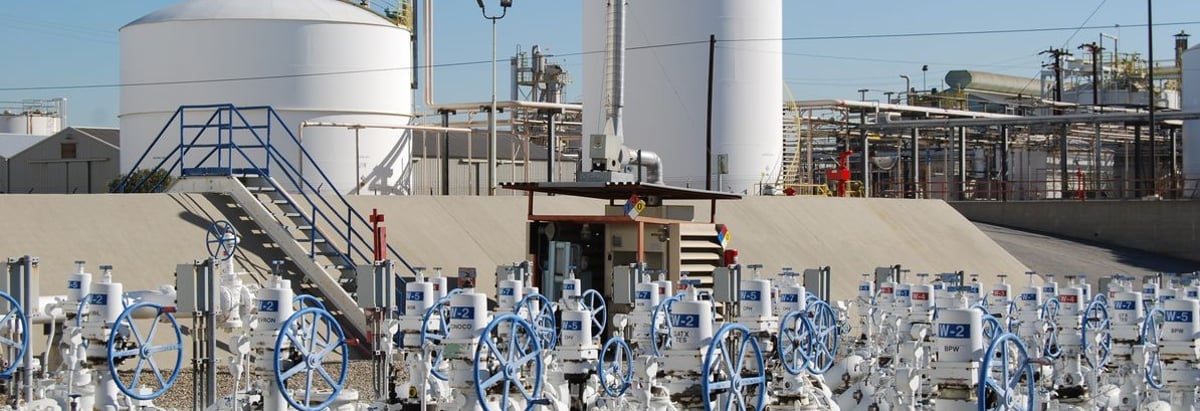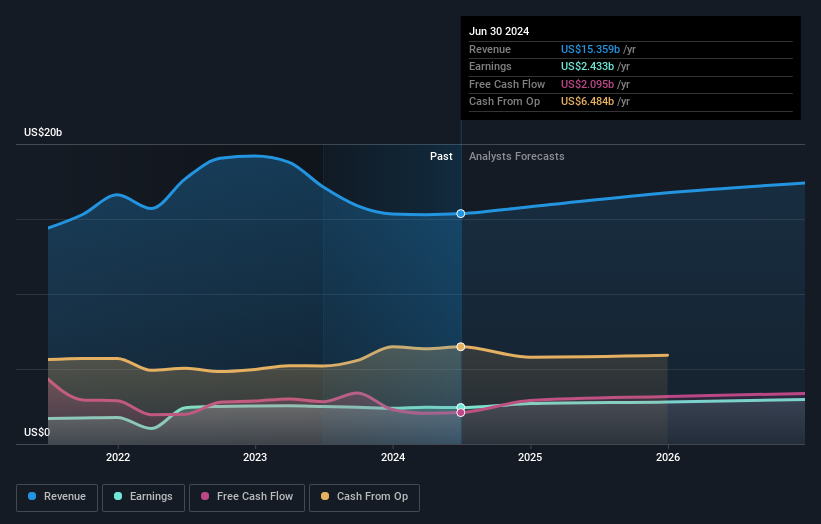- United States
- /
- Oil and Gas
- /
- NYSE:KMI
Institutional investors control 67% of Kinder Morgan, Inc. (NYSE:KMI) and were rewarded last week after stock increased 4.7%

Key Insights
- Significantly high institutional ownership implies Kinder Morgan's stock price is sensitive to their trading actions
- 50% of the business is held by the top 20 shareholders
- Recent sales by insiders
If you want to know who really controls Kinder Morgan, Inc. (NYSE:KMI), then you'll have to look at the makeup of its share registry. We can see that institutions own the lion's share in the company with 67% ownership. Put another way, the group faces the maximum upside potential (or downside risk).
And last week, institutional investors ended up benefitting the most after the company hit US$55b in market cap. The gains from last week would have further boosted the one-year return to shareholders which currently stand at 52%.
Let's delve deeper into each type of owner of Kinder Morgan, beginning with the chart below.
View our latest analysis for Kinder Morgan

What Does The Institutional Ownership Tell Us About Kinder Morgan?
Many institutions measure their performance against an index that approximates the local market. So they usually pay more attention to companies that are included in major indices.
We can see that Kinder Morgan does have institutional investors; and they hold a good portion of the company's stock. This suggests some credibility amongst professional investors. But we can't rely on that fact alone since institutions make bad investments sometimes, just like everyone does. When multiple institutions own a stock, there's always a risk that they are in a 'crowded trade'. When such a trade goes wrong, multiple parties may compete to sell stock fast. This risk is higher in a company without a history of growth. You can see Kinder Morgan's historic earnings and revenue below, but keep in mind there's always more to the story.

Investors should note that institutions actually own more than half the company, so they can collectively wield significant power. Hedge funds don't have many shares in Kinder Morgan. Our data suggests that Richard Kinder, who is also the company's Top Key Executive, holds the most number of shares at 12%. When an insider holds a sizeable amount of a company's stock, investors consider it as a positive sign because it suggests that insiders are willing to have their wealth tied up in the future of the company. For context, the second largest shareholder holds about 9.0% of the shares outstanding, followed by an ownership of 7.1% by the third-largest shareholder.
After doing some more digging, we found that the top 20 have the combined ownership of 50% in the company, suggesting that no single shareholder has significant control over the company.
Researching institutional ownership is a good way to gauge and filter a stock's expected performance. The same can be achieved by studying analyst sentiments. Quite a few analysts cover the stock, so you could look into forecast growth quite easily.
Insider Ownership Of Kinder Morgan
The definition of company insiders can be subjective and does vary between jurisdictions. Our data reflects individual insiders, capturing board members at the very least. Company management run the business, but the CEO will answer to the board, even if he or she is a member of it.
Most consider insider ownership a positive because it can indicate the board is well aligned with other shareholders. However, on some occasions too much power is concentrated within this group.
Our most recent data indicates that insiders own a reasonable proportion of Kinder Morgan, Inc.. Insiders own US$6.9b worth of shares in the US$55b company. That's quite meaningful. Most would be pleased to see the board is investing alongside them. You may wish to access this free chart showing recent trading by insiders.
General Public Ownership
The general public, who are usually individual investors, hold a 21% stake in Kinder Morgan. This size of ownership, while considerable, may not be enough to change company policy if the decision is not in sync with other large shareholders.
Next Steps:
It's always worth thinking about the different groups who own shares in a company. But to understand Kinder Morgan better, we need to consider many other factors. Case in point: We've spotted 3 warning signs for Kinder Morgan you should be aware of, and 2 of them are significant.
Ultimately the future is most important. You can access this free report on analyst forecasts for the company.
NB: Figures in this article are calculated using data from the last twelve months, which refer to the 12-month period ending on the last date of the month the financial statement is dated. This may not be consistent with full year annual report figures.
Valuation is complex, but we're here to simplify it.
Discover if Kinder Morgan might be undervalued or overvalued with our detailed analysis, featuring fair value estimates, potential risks, dividends, insider trades, and its financial condition.
Access Free AnalysisHave feedback on this article? Concerned about the content? Get in touch with us directly. Alternatively, email editorial-team (at) simplywallst.com.
This article by Simply Wall St is general in nature. We provide commentary based on historical data and analyst forecasts only using an unbiased methodology and our articles are not intended to be financial advice. It does not constitute a recommendation to buy or sell any stock, and does not take account of your objectives, or your financial situation. We aim to bring you long-term focused analysis driven by fundamental data. Note that our analysis may not factor in the latest price-sensitive company announcements or qualitative material. Simply Wall St has no position in any stocks mentioned.
About NYSE:KMI
Kinder Morgan
Operates as an energy infrastructure company primarily in North America.
Acceptable track record low.

